Islam

“Sticks and stones can break my bones, but words can never hurt me.”
How many of us grew up with this old adage ringing in our ears? How many of us believe it’s true?
I’ve gone back and forth over the years. I understand that the saying is an invitation to turn our backs on harsh, mean-spirited words thus robbing them of their power, but how many of us are really capable of simply doing that? The truth is words do hurt and sometimes they do more than hurt. Sometimes they are downright destructive and on a large scale.
I think this is what the writer of James is getting at in this morning’s text. Words, the works of our tongues, can be used for good and evil. It is not always easy for us to shape our words and move our tongues in a fashion that serves our faith, our calling as Christians, our work for the reign of God on earth.
One important spiritual discipline, one vital element to our faith formation, then, is learning to tame the tongue. That is, we are challenged to develop custody of our speech in such a way that good news is proclaimed and people are lifted up toward the fulfillment of their creation in the image and likeness of God. Remember, James is especially concerned that we align our words and our work so we both “talk the walk” and “walk the talk.”
If we are offspring of the heavenly parent, if we are made in the likeness of God, how should that shape our speech and control the way we wag our tongues?
Muslim and Coptic Christian leaders in the U.S. are pledging not to let a spate of violent protests in some 20 Islamic countries derail recent efforts to improve the sometimes troubled relations between the two communities.
On Sept. 18, the Egyptian government ordered the arrest of seven Egyptian-born Copts now living in the United States who were allegedly involved in an anti-Muslim film that portrayed Islam's Prophet Muhammad as a bumbling sexual pervert.
“We cannot allow the actions of a few deceived fanatical individuals to define our communities,” said Bishop Serapion, head of the Los Angeles Diocese of the Coptic Orthodox Church, speaking during a press conference on Sep. 17 with Muslim leaders in Los Angeles.
“We call on members of both religions to lean on our faiths to counter the hate and the violence with good speech and positive work,” added the Egyptian-born bishop.
The show of solidarity comes almost a week after protesters in Egypt, where about 10 percent of the 90 million Egyptians are Coptic, attacked the U.S. embassy, setting off protests in other Muslim countries, including neighboring Libya, where American ambassador Christopher Stevens and three other Americans were killed.

Anti-American riots that have spread to more than a dozen countries across the Middle East are a sign of fissures between radical and more moderate Islamists that are vying for power as their societies undergo change, Middle East experts say.
Whether U.S. foreign policy has helped create a political environment where radicals are struggling to remain relevant, or emboldened extremists to act out, is a matter of disagreement.
President Obama's approach to the Arab Spring, to engage with the Islamists and not the secularists, "is seen by our foes as disengagement, while the radicals are not backing off," said Walid Phares, an adviser to the Anti-Terrorism Caucus in the U.S. House of Representatives and author of the 2010 book The Coming Revolution: Struggle for Freedom in the Middle East.
"When we withdraw, they advance."
Tamara Wittes, who served as deputy assistant secretary of state for Near Eastern Affairs until a few months ago, sees it differently.
The U.S. military withdrawal from Iraq removed "a massive source" of grievance for ultra-conservative Muslims, called Salafis, who have been leading the charge in the recent protests and who are ideologically close to Islamic terrorists who have warred with the U.S., Wittes said. "Now they're left trying to gin up anti-American feelings over this campy movie. If Salafi groups are left having to troll the Internet for a pretext, I think we're in pretty good shape."

Worshippers at Toronto's Salahuddin mosque were bracing for protests Friday as part of "Walk Your Dog in Front of a Mosque Day."
The event is being organized by supporters of a man who claims Muslim protestors kicked his English mastiff, Cupcake, during an anti-Israel rally last month.
While claiming that they wanted to draw attention to Muslim attitudes toward dogs, the organizers' Facebook page is replete with hostilities. One man wrote that he would throw protestors into a "lake of fire" and shoot their dogs, and the event has been promoted on a white supremacist website, StormFront.org.
Some Muslims responded with their own "Good Muslims Love Dogs" Facebook page, including at least one photo of a veiled woman with a veiled dog.
Muslims' alleged canine-phobia is often cited by critics of Islam as an example of how the faith is incompatible with Western values. Some Muslims have perpetuated that narrative, such as when a Somali cab driver in Minneapolis made national headlines in 2007 when he refused to let a blind man bring his seeing-eye dog into his car.
Yet many Muslims all over the world have dogs, and dogs figure prominently is some Islamic countries, such as Turkey, famous for its Kangal and Akbash breeds.
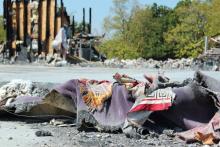
When the mosque in Joplin, Mo., on the outskirts of town burned to the ground on Aug. 6, the imam’s 4-year-old son knew what to do.
He wanted to build another.
After all, that’s what his family had done with their home after it was destroyed by the tornado that tore through the town a little more than a year earlier.
The imam's family has a new home, but the wait for a new mosque is going to take a while.
A little more than a month after the Islamic Society of Joplin mosque was destroyed by fire, the local Muslim community is moving forward with support from the interfaith community.
But progress is slow.

When inflamed mobs stormed the U.S. embassies in Libya and Egypt on Tuesday, the media quickly looked to a likely spark.
Florida Pastor Terry Jones ignited deadly riots by threatening to burn Qurans in 2010, and by torching the Islamic holy text last year. Recently, Jones said he would promote a crude film that portrays Islam’s Prophet Muhammad as a foolish sexual pervert.
But in the days before the protests, Jones made no public mention of the film — called Innocence of Muslims — even as he prepared to stage an “International Judge Muhammad Day” on Sept. 11.
Instead, the man who translated the film into Arabic, sent it to Egyptian journalists, promoted it on his website and posted it on social media was an obscure Egyptian-born Coptic Christian who lives near Washington and proudly touts his ties to Jones.
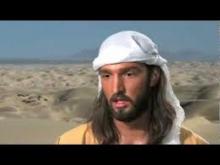
I finally sat down and watched the entire 11-plus minute video, Innocence of Muslims, which is at the heart of the recent outrage in Islamic countries in Yemen and north Africa. Suffice it to say, I lost a healthy share of brain cells in the process. The narrative – if you can call it that – is incoherent throughout, the sound is barely audible in places and the overall production values make the Annoying Orange series look like Scorsese.
That said, there’s plenty to anger Muslims in this clip, or anyone who values religious tolerance, plural coexistence, or even basic respect for human nature.
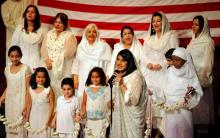
Two years after the Sept. 11 attacks, Timothy O'Leary sat in an audience of 2,000 New Yorkers listening to the Brooklyn Philharmonic perform a concert about terrorism — the 1985 murder of an American tourist by members of the Palestine Liberation Front on a Mediterranean cruise ship. It was one of the most powerful moments he'd ever had in a theater.
Terrorism stories are rarely happy stories, and yet the path O'Leary has taken — from bringing the controversial opera "The Death of Klinghoffer" to St. Louis last year to a Sept. 11 memorial concert on Sept. 9 — ends with a hopeful, permanent pairing of faith and the arts in St. Louis.
Religious rights activists are hailing the release over the weekend of an Iranian pastor accused of apostasy and a Pakistani girl who was charged with blasphemy.
Pastor Youcef Nadarkhani was released on Saturday after a six-hour hearing, reported the American Center for Law and Justice, which worked to garner American support for the minister’s release. The Christian convert had faced possible execution.
“Your prayers, your advocacy, and your voice has been heard,” read an online announcement from ACLJ.
The U.S. Commission on International Religious Freedom welcomed Nadarkhani’s release “after being unjustly imprisoned for three years because of his faith,” said its chair, Katrina Lantos Swett.
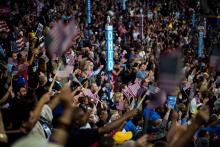
The number of Muslim delegates attending the Democratic National Convention has quadrupled since 2004, according to a Muslim advocacy group.
The Washington-based Council on American-Islamic Relations counts more than 100 Muslim delegates representing some 20 states at the Democratic convention in Charlotte, N.C., this week. That's up from 25 delegates in 2004, according to CAIR.
CAIR government affairs coordinator Robert McCaw said the numbers were ”a sign of the American Muslim community’s growing civic engagement and acceptance in the Democratic Party.” He also said that Democrats had targeted outreach to American Muslims.
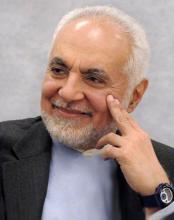
Imam Feisal Abdul Rauf has spent most of his adult life trying to build interfaith and international bridges. But to many Americans, he is the public face of the so-called "Ground Zero mosque," one of the most controversial religious projects in recent U.S. history.
Rauf reflects on that turmoil in his new book, Moving the Mountain: Beyond Ground Zero to a New Vision of Islam in America. But as the book's subtitle suggests, the longtime imam spends most of his time facing forward — toward the development of a distinctly American brand of Islam. He spoke recently with Religion News Service. This interview has been edited for length and clarity.
Q: Why did you write this book?
A: I wrote this book because the American public saw me and heard me, but really didn’t get to know me very well, or to understand what my work was all about. This book is my calling card to the American public.
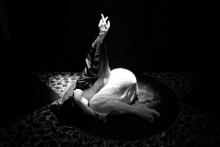
The Taliban in Afghanistan shocked the world this week when they beheaded 17 people, allegedly for the crime of dancing at a mixed-gender gathering.
Which prompts the question: Does Islam forbid dancing? While Islamic scholars are divided on the answer, it’s easy to find Muslims in America and abroad who love to boogie down.
“Even though there are scholars who forbid dancing, there is a long tradition of dancing in Muslim cultures,” said Vernon Schubel, a Muslim and professor of religious studies at Kenyon College in Ohio.
There is no mention of dancing in the Quran, which serves as Muslims’ primary source of guidance. There is a story about dancing in the hadith, or collected stories about Islam’s Prophet Muhammad, which are the second-most important source of guidance for Muslims.
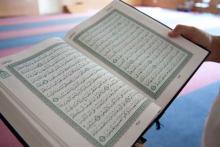
This year during Ramadan — the ninth month of the Islamic lunar calendar when Muslims believe the Quran was first revealed to the Prophet Muhammad — I was in solidarity with my Muslim sisters and brothers throughout the world by reading the Quran. But here's the thing: I am a Roman Catholic.
My copy of the Quran, with more than 1,700 pages, has sat on the top shelf of my bedroom bookcase among other sacred texts for 14 years. Typically I would use it as a sporadic reference and resource to better understanding Islam, reading a few short passages at a time.
However, this Ramadan something at the core of my being was calling me to read the Quran in its entirety. And so my monthlong Ramadan journey began.
Each day and evening, the prayerful poetry in the Quran held me in a meditative mode of peace as I read without being aware of the passage of time.
When I finished reading a week before the end of the month, I felt as if the Quran was almost endless, reaching beyond the confines of my calendar days. I didn’t want to read the last page. I didn’t want to be finished.
The Quran inspired me, taught me and helped me to remember my essential holiness and how that holiness in the image of God should be reflected in the world.
After four years of living in the U.S., Mohamed Jedeh is anxious to return to his native Libya.
It irks him that his local mosque in Union City, N.J., won’t broadcast the Muslim call to prayer for fear of angering neighbors, yet nobody complains about the noise from a local bar. Back home, there are no scantily clad women walking across his sight line, and fasting during the holy month of Ramadan is easier because almost everyone is doing it.
Jedeh would probably be home by now if he hadn't been asked by a mosque in Boston to help with special nightly Ramadan prayers. After graduating in May with a master's degree in clinical research from the New York University College of Dentistry, he's ready to get back to the small city of Zintan in northwest Libya, where he plans to teach dentistry and work at a local clinic.
“It’s different,” said Jedeh, who flies back on Aug. 20. “I miss the Islamic atmosphere.”
Despite his homesickness, Jedeh said he has had a positive experience in the U.S. He initially worried about his wife's safety because she wears a niqab, or face veil, but except for one insult shouted by a passerby, he and his family have been treated respectfully.
“I believe you cannot judge any country and say, all people are good or all people are bad,” said Jedeh.
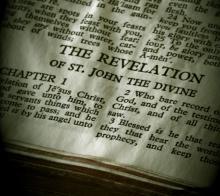
It was the summer of 1994 and about 10 friends and I sat huddled around Bibles in my friend’s living room. It was a “scripture party.” The lights were dim and the air was full of anticipation and mystery. We did not know what God might reveal as we opened the book of Revelation and read it out loud, in community, in one night.
This bears resemblance to the way the early church would have read the scripture. They were an oral culture, not a written one. The Hebrew Bible was written on scrolls that were read aloud to congregations. Most of the New Testament was written as letters to the worshiping bodies of whole cities (i.e. the saints in Ephesus, the church in Philippi, the body in Corinth, etc.). When received, the letters would be read out loud to the whole church community and received as God’s instruction revealed through the apostles for the edification of their communities.
Imagine being one of the very first followers of the Jesus “Way” (Acts 9:2).
Imagine being a persecuted religious group. You have to use code — the sign of the ichthys — to identify yourself to other believers for fear of religious persecution. Only when you are gathered together in secret can you speak openly about your faith. Only then can you be fully known and appreciated for the whole image of God that lives inside of you.
Imagine huddling in a secret meeting place and reading the Apostle John’s Revelation of Jesus Christ for your nascent faith community in Ephesus or Smyrna, or Pergamum, or Thyatira, or Sardis, or Philadelphia, or Laodicea (Revelation 2-3). Imagine living in Ephesus and reading Paul’s prayer for your church to understand its hope and inheritance (Ephesians 1:17-2:22).
And imagine being rich in the early church and hearing James’ letter warning: “Listen! The wages of the laborers who mowed your field, which you kept back by fraud, cry out, and the cries of the harvesters have reached the ears of the Lord of hosts.”
Imagine hearing it all for the first time. It all feels so real. The call to holiness feels so urgent because God feels so present.
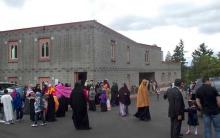
Nearly all Muslims can agree on the basic beliefs of Islam: There is one God, Muhammad is God’s prophet, Muslims should fast during the holy month of Ramadan, and give alms to the poor.
Yet beyond these central pillars of the faith, Muslims worldwide vastly differ as religious convictions are shaped by cultural and social contexts, according to a new report by the Pew Forum on Religion & Public Life.
“The World’s Muslims: Unity and Diversity” draws on 38,000 face-to-face interviews in 39 countries, and finds that Muslims differ sharply over questions of faith like who counts as a Muslim and what spiritual practices are acceptable.
With 1.6 billion adherents, Islam is the world’s second-largest religion, behind Christianity, and accounts for one-quarter of the world’s population.
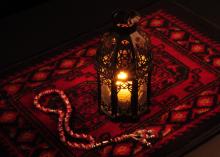
EDITOR'S NOTE: Ramadan's first day of fasting began today at dawn. This year, Sojourners' Director of Mobilizing, Lisa Sharon Harper, has chosen to keep the fast during the Muslim holy month alongside our friend, Imam Feisal Abdul Rauf. Both Lisa and Imam Feisal will be blogging regularly during the coming days and weeks of Ramadan, sharing with our readers their personal reflections on what the holy month, the fast and journeying together as a Christian and a Muslim means to them. To learn more about Ramadan and its sunrise-to-sunset monthlong fast, click HERE.
LISA SHARON HARPER:
In 2004 I led a group of Intervarsity students on a journey through Croatia, Bosnia, and Serbia on a Pilgrimage for Reconciliation. For four weeks we traveled throughout all three countries investigating the roots of conflict and seeds of peace being planted between the Catholic Croatians, Muslim Bosniaks, and Orthodox Serbs. Along the way, we met with Miroslav Volf, who was vacationing in his home country of Croatia at the time. One of my students asked Volf the same question I asked my mentor years before: “How do you engage in interfaith activity without watering down your own faith?” Volf answered with one word: “Respect.”
He explained that Jesus says the greatest commandment is to love God and to love our neighbors as we love ourselves. Love requires respect. We may not agree with our neighbors, but we must respect their minds and their ability to choose the faith they will practice...
That is why I have chosen to embrace my Muslim neighbors by practicing the Fast of Ramadan this year with a spiritual leader who I admire and look forward to learning from, Imam Feisal Abdul Rauf.
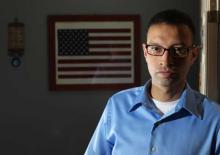
At 26, Syed Farhaj Hassan was a devout Muslim, and a man who took a lot of pride in being one of the relatively few Muslim Americans to join the military and then go to war in Iraq.
He dropped out of Rutgers University and enlisted in the U.S. Army in 2001. He was sent to Iraq two years later, where he served with a unit that assessed and planned the rebuilding of places like the war-torn city of Hillah, where he even slept some nights in one of Saddam Hussein’s palaces.
Born in Chicago and raised in New Jersey, he’d grown up engrossed in military-themed TV shows like “M*A*S*H” and “G.I. Joe.” And nearly a decade after his war service, he’s still patriotic — he’s even an active reservist in a civil affairs brigade.
But these days, Hassan is also frustrated and upset with an arm of the U.S. government. Hassan said that he’s been “betrayed” by the New York City police department for its years of post-9/11 spying on Muslim communities in New Jersey.
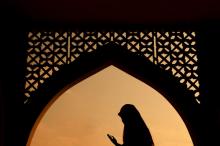
I have been discovering more each day how much I love Muslim people. They are beautiful, warm people, yet we are afraid of them because of misconceptions based on our stereotypes of their race.
I have friends who were living in the Middle East for four years and were sharing about how amazing they find Muslim people. Through my own encounters and my friend’s experiences, here’s what muslim people have taught me.
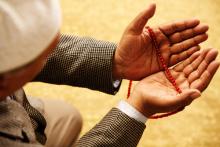
In the past two years, the FBI has placed at least five men with affiliations to the mosque, including its longtime religious leader, on the nation's no-fly list, a roster of suspected terrorists barred from flying in the United States. None has been charged with a terrorism-related offense, and federal officials haven't told them why they're on the list.
The unexplained actions are aggravating the FBI's already poor relationship with the mosque and fueling fear and frustration among Muslims that their house of worship appears to be once again in the government's crosshairs.
"It's not that we're doing anything wrong," said Jesse Day, who converted to Islam two years ago and regularly attends the Friday services. But like many others at the mosque who flinch at the sight of a camera and suspect an informant moves among them, he worries.